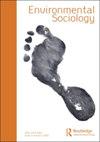Climate change risks and global warming dangers: a field analysis of online US news media
IF 2.8
Q3 ENVIRONMENTAL STUDIES
引用次数: 5
Abstract
ABSTRACT Studies have shown that contrasting understandings of climate change (CC) and global warming (GW) are associated with political identities in the US, however, less is understood about how these differences are represented in news media. This study examines how the problem names CC and GW are associated with risk-related keywords in a field of online US news media. Results show that the contrast between CC and GW corresponds with a distinction between risk and danger, with newspapers and left/liberal media linking risk with CC and cable news and right/conservative media linking danger with GW. A secondary contrast between mainstream and alternative media shows mainstream news sites connecting both CC and GW to risk-related knowledge (uncertain, probability) while alternative left- and right-wing sites connect CC and GW to risk-related action (endanger, threaten). This study contributes to the understanding of climate risk by identifying how CC and GW are framed and politicized in the media through the use of risk-related keywords. These findings can inform how climate communicators and researchers engage with diverse and divergent audiences.气候变化风险与全球变暖危险——美国在线新闻媒体的实地分析
摘要研究表明,对气候变化(CC)和全球变暖(GW)的不同理解与美国的政治身份有关,但对这些差异在新闻媒体中的表现却知之甚少。本研究考察了问题名称CC和GW如何与美国在线新闻媒体领域的风险相关关键词相关联。结果表明,CC和GW之间的对比符合风险和危险的区别,报纸和左翼/自由派媒体将风险与CC联系起来,有线新闻和右翼/保守派媒体将危险与GW联系起来。主流媒体和另类媒体之间的二次对比显示,主流新闻网站将CC和GW与风险相关知识(不确定、概率)联系起来,而另类左翼和右翼网站则将CC和GW与风险相关行动(危害、威胁)联系起来。这项研究通过使用与风险相关的关键词,确定CC和GW在媒体中是如何被框定和政治化的,有助于理解气候风险。这些发现可以为气候传播者和研究人员如何与不同的受众互动提供信息。
本文章由计算机程序翻译,如有差异,请以英文原文为准。
求助全文
约1分钟内获得全文
求助全文
来源期刊

Environmental Sociology
ENVIRONMENTAL STUDIES-
CiteScore
4.60
自引率
12.00%
发文量
34
期刊介绍:
Environmental Sociology is dedicated to applying and advancing the sociological imagination in relation to a wide variety of environmental challenges, controversies and issues, at every level from the global to local, from ‘world culture’ to diverse local perspectives. As an international, peer-reviewed scholarly journal, Environmental Sociology aims to stretch the conceptual and theoretical boundaries of both environmental and mainstream sociology, to highlight the relevance of sociological research for environmental policy and management, to disseminate the results of sociological research, and to engage in productive dialogue and debate with other disciplines in the social, natural and ecological sciences. Contributions may utilize a variety of theoretical orientations including, but not restricted to: critical theory, cultural sociology, ecofeminism, ecological modernization, environmental justice, organizational sociology, political ecology, political economy, post-colonial studies, risk theory, social psychology, science and technology studies, globalization, world-systems analysis, and so on. Cross- and transdisciplinary contributions are welcome where they demonstrate a novel attempt to understand social-ecological relationships in a manner that engages with the core concerns of sociology in social relationships, institutions, practices and processes. All methodological approaches in the environmental social sciences – qualitative, quantitative, integrative, spatial, policy analysis, etc. – are welcomed. Environmental Sociology welcomes high-quality submissions from scholars around the world.
 求助内容:
求助内容: 应助结果提醒方式:
应助结果提醒方式:


